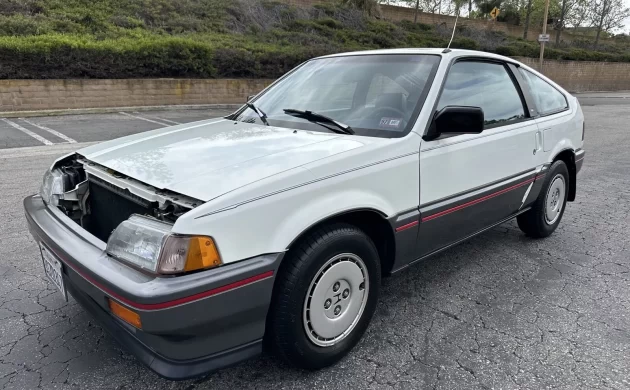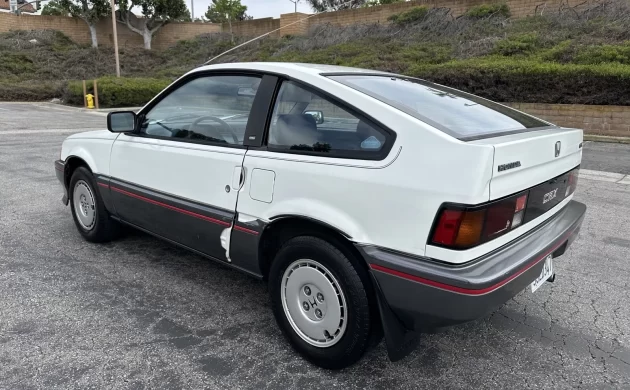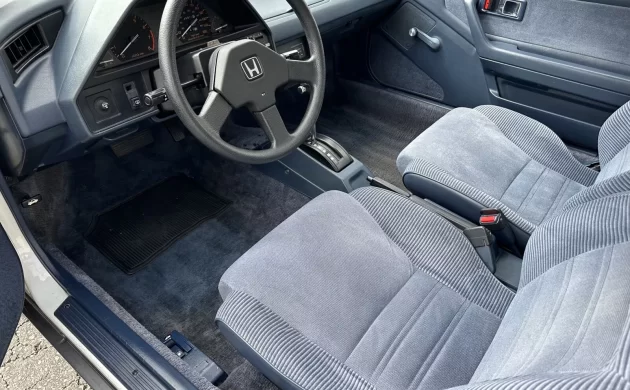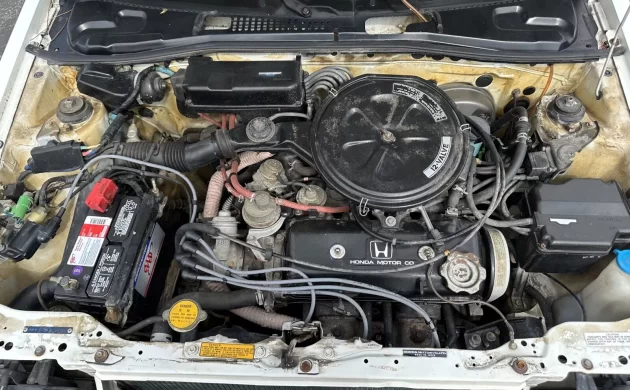The Honda CRX has long been viewed as one of the predominant hot hatches of the 1980s, but for many of the original buyers of this model, it was more sought after for being an economical mode of transportation with impeccable reliability. The CRX shown here is a low mileage example that has been under long-term family ownership and sadly suffers some typical cosmetic damage that is due to the nose section’s fragile plastic panels. The CRX appears to be rust-free, thus negating one of the primary concerns with a vintage Japanese machine such as this. Find it here on eBay with bids to $2,025 and no reserve.
The CRX was introduced not as a VW GTI fighter but more to provide consumers with an entry point into the Honda brand as well as a fuel-sipping hatchback with attractive looks. Yes, I’m sure Honda always had it in the back of their minds that they could easily transition the CRX into a slick-handling, rev-happy street machine, but I’m sure at the end of the day the overwhelming majority of the visitors to its showroom were more compelled by the ranges of 40 miles per gallon and beyond over whether it could dominate a GTI in the pavement grand prix. This is a mid-range trim model in the CRX lineup owing to its attractive wheel covers and it comes with the optional mudflaps (which you can sell for a tidy profit on eBay should you find a clean set in the junkyard.)
Now, the one ding against this car is the fact that it’s equipped with an automatic transmission. Honda has long been known for building some of the best manual transmissions in the business, as even buyers of the most basic spec of Honda vehicles get treated to an incredible smooth-shifting manual gearbox. Still, I’m not surprised we see the automatic in a car like this as again, many buyers were simply adults who wanted a reliable commuter car in which the redline would hardly ever be kissed. The good news is the slushbox likely means this CRX was used very gently, which helps explain its clean condition today. The bucket seats and interior plastics all appear to be in excellent condition.
The 1.5L engine makes a humble 75 horsepower, but like most Honda products from this era, the light weight more than offsets the lower power ratings. The seller notes the CRX has been in the same family since new, and that some recent maintenance work has been carried out, including a new brake master cylinder, brake booster, oil change, and some vacuum hose replacement. The best bet here is to find a CRX in the boneyard that doesn’t have damaged plastic panels (good luck) and attempt to replace the broken pieces here so you can reveal in full the clean and stock cosmetic condition that is likely this car’s greatest selling point.









For a “low mileage” car, it’s had a hard life.
And, it can’t be considered a hot hatch, it’s automatic FFS.
Too bad it’s an automatic.I’ve looked at these,
but are always priced too high,or have the plastic
problem.
Too bad it is an automatic. I noticed it Does not have a/c and also it has a triple A battery. Still a decent commuter car from the 1980’s
I worked at a Honda dealer in the late 80s. I remember these when they were new, and late model used cars. This looks like its in good shape other than the missing plastic nose. You didnt see many CRX with an automatic, but they were out there. Some people just wanted an economical little runabout. These were fun the drive, the HF version was geared a bit high for fuel mileage bit the LX and SI were fun.
Years ago I bought a 1986 Grand Am GT with the quad four. But the gray plastic panels were in similar condition. I simply took them off and revealed the untouched white body color paint, and it never took away the looks away from the car. I think it made it look cleaner.
Honda is known to have one of the best manual transmissions – true. The other part of that statement is Honda was known to have automatic transmissions prone to failure.
Johnnymopar-
I believe I agree w/ you on that. I had a friend w/ a Odyssey minivan and he was on automatic transmission #3 when I sold it for him.
I had another friend who had good luck w/ her first Civic and bad luck w/ the second.
People think of Honda as the gold standard but they have their flaws, just like any other manufacturer.
If I had to pick the “overall most reliable” manufacturer, I’d go w/ Toyota even though they have had a few problems too.
~Lothar
There is a solution to everything if you filter through the nonsense. Current Honda Automatics need frequent fluid changes with Honda ATF fluid. Do not substitute. Every 30k miles is a good interval. If you have issues, do it at every oil change for a while. All modern automatics from all manufacturers are critically tuned for efficiency. None are exempt from similar recommendations. Likewise, their manual transmission fluid is the best “street use” fluid for their manual transmissions. Both are reasonably priced at the dealership. Goofy online vendors sometimes charge twice what the dealer parts department charges? Go figure???
Ah, the Honda Cruex. The entry level secretaries “sports” car.
What front end/grill can I adapt to put on this? Man, I have car issues.
A internet search showed me there are used factory or aftermarket parts that are surprisingly expensive at $400-$500. There was one company that you had to call for availability so who knows about the price.
Wonder if it’s the same piece for a regular civic? If so, could be cheaper going that route possibly? Think of the increased cooling capacity with the missing nose piece!
The automatic kills it for me as far as the fun factor. My wife used to have a base ‘90 Civic with a 4 speed (yes, a 4 speed it was that entry level) but it was fun to drive with the manual tranny despite the low hp rating. This car could be a nice cruiser though.
Would love it. You could probably get another 150k KM out of it. Auto sucks, but what can you do…
Had one of these. Ran great until I jump started a guy at a gas station. Continued to blow ignition modules after that. You can get one person in the back, or, two friendly!
For a low mileage car, this family drove it hard. All those broken plastic pieces don’t just happen with normal driving. These are hot little cars, but more so with the manual. This car would be a strong pass.
Really doesn’t mean it was abused as the plastic fenders and nose piece would get brittle at the mounting points and almost fall off the car or crack if you leaned against them. Never understood the point in doing it the way they did them.
To be fair, cars aren’t designed to last 37 years. Ten years is the typical expected lifespan, and molded plastic parts are more than capable of surviving that long. Tooling for plastic parts is less expensive, making it cheaper to get into production and cheaper to facelift.
Reminds me of the 1991 CRX Si I bought used in 1993.
It was white with a manual transmission of course.
It was my first nice car. I took care of it mechanically and cosmetically.
I loved that car! It served me well for 9 years.
I bought it for $9200 and sold it in one day for $8600
Surprisingly Honda still carries a lot of these parts, or a good parts man can do a dealer locate. What broke these panels at the mounts taking them on and off, besides getting brittle with age, is they were supposed to be held on with rubber grommets that had a metal insert for the mount bolts to go through, but people would lose them and just bolt them down cracking the plastic at the holes.
To appreciate Honda’s of this era, it really begs for the manual transmission. With that said, the interior, underside, and under hood confirm the low miles. This is a solid car with two cosmetic bolt-on repairs required. With bidding still under $4k for a 37-year survivor, someone will get a good deal. With all due respect to the opinion of others, Hondas of this era will run +300k with moderate care. Heck, I have bought them after 100k miles, ran them hard, and still got +300k miles then sold them as drivers.